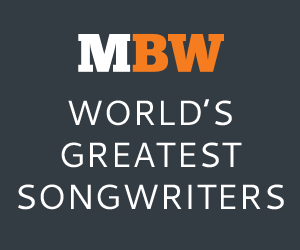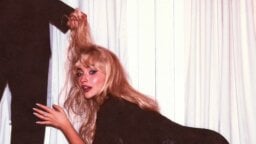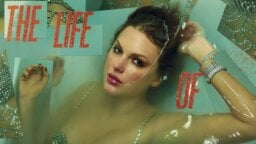MBW’s World’s Greatest Songwriters series celebrates the composers behind the globe’s biggest hits. This time out we talk to Steph Jones, long-time writer for Sabrina Carpenter who has also worked with Teddy Swims, Selena Gomez, BLACKPINK and others. World’s Greatest Songwriters is supported by AMRA – the global digital music collection society which strives to maximize value for songwriters and publishers in the digital age.

She co-wrote Carpenter’s global smash Espresso, has a credit on Swims’ debut album, I’ve Tried Everything But Therapy (Part One), for the song Flame (plus more to come soon) and boasts a catalog that has seen songs released with the likes of Selena Gomez, BLACKPINK, Panic! At The Disco, P!nk and Kelsea Ballerini.
Her recent success has been hard-earned — Jones has been writing full-time for the best part of 12 years. Still, due to the often dire earning economics that exist for songwriters, she says that it was only four or so years ago that her performing rights royalties became a significant source of income that offered her some stability beyond her publishing advance.
“I’ll never stop speaking about how unfair it is that the value of a song is sometimes put in the wrong place, or not enough in the correct places.”
“It’s ridiculous that sometimes I would have 30-something songs come out in a year and was still only able to live on my advance that I owe back,” she tells us. “I’ll never stop speaking about how unfair it is that the value of a song is sometimes put in the wrong place, or not enough in the correct places.”
More on that later.
Jones, who was born in Missouri, started her songwriting career in her late teens in church. As worship leader, she was tasked with improvising choruses for prayers that members would spontaneously sing into the mic in a room that was dedicated to live music.
For the improvisations that stuck with her, she’d go back to the recordings and write a song around them to perform during Sunday service. The pastor, who Jones calls her first A&R, would allow her to test new songs across three services in a row and keep singing the ones that hit a note with the congregation.
“It had to be catchy, it had to be easy enough for everyone to sing along,” she says. “Even in that element, when I was doing random singing choruses, I could feel when people connected more quickly to something. There was a lot of learning how to pick out what connects in my history, now that I think about it.”
The other element of Jones’ A&R training came from her musician dad, who’d trade albums with her and ask her which songs she thought the singles were. Alongside honing her ability to identify a potential hit, it helped her develop a diverse musical palette, which spanned the Spice Girls and Backstreet Boys to Bruce Hornsby and Don Henley, and the R&B and soul acts her mom loved, like Luther Vandross and Anita Baker.
After moving to Austin, Jones landed her first placement accidentally with a co-write on a song called Butterflies, written with a friend who went by the artist name of Liz Golden. The track made its way onto US reality TV show The Hills via a family connection of Golden’s. It was the first time that Jones realized she preferred serving the artist, rather than being the one in the spotlight.
“Serving a song and serving the artist was really exciting to me. From that point, I was like, ‘That’s cool, I don’t have to be the one to sing it.’”
After meeting a connection working in music in Nashville, and realizing the existence of the industry behind the songs, Jones moved there and spent the next eight years working at Starbucks on Music Row.

Jones has worked with Carpenter for 10 years and Swims for five and says her proudest career moments have been helping new acts figure out “what makes them, them.” Some of the other acts she’s worked with early on include country artist Carter Faith, X Factor contestant Bea Miller, actresses and singers Olivia Holt and Snow Wife and British musician Master Peace. More recently she has worked with artisrts including Amber Mark, Jelly Roll and Laci Kaye Booth.
Here, we chat to Jones about finding inspiration, lessons learned across her career and the challenge of making a living as a songwriter today.
You’ve worked with a lot of artists early on in their careers. What are some of the strategies or approaches you have for helping them find their voice?
Presence in a room, noticing and really listening to people. Trying to see the thing behind the thing.
When I work with new artists, I often go to YouTube or their online pages and look at live performances. I’m always listening, going, ‘Is there something that sticks out about their voice or tone that maybe isn’t making it into the recordings and the songs they’re writing?’
I’ll also be asking, What do they speak to me as someone who doesn’t know them when I’m listening to them? What are they really telling me about themselves? Is there something here that’s not being seen for what it is? I want to see what’s there, not what can be made up.
Espresso has been a huge hit this year. Can you tell me how that song came about?
Sabrina always wanted to write in Paris. She’s the biggest manifester I’ve met — I’ve never seen someone else throughout their career and life say, ‘I want to do this thing’ and then watch it happen.
So Paris is where Espresso was written and we were just having fun. There’s no real magic behind the curtain moment about it. We were in a new place, with friends, everyone trusted each other and we were just trying stuff.
When you heard the finished song, was that one of ones you were able to identify as being single and a potential hit, or has its success been a complete surprise?
I pretty much never claim to know. I quit trying to know a few years ago. I would often think something was my favorite, but that’s because of a certain bias of mine. I definitely thought it had an identifiable quality, as most of her songs do. She’s really incredible at doing that.
This is my fifth album working on with her, which I feel so honored about. She’s always been down to try a lyric in a new way and make it relatable, but still quirky and true to her. I’m a huge fan of that.
On the subject of your songwriting process, where do you find inspiration?
The inspiration starts at home. For me, every day, it’s perfume, which is the weirdest thing. I am not really religious anymore, but something that I still use in my daily life from that time is from the Lord’s Prayer, where it says, ‘give us today our daily bread’. I think about that all the time and meditate on that thought.
What’s for today? I don’t want the stale stuff that’s old and I don’t want something that’s not ready yet. So I pick a perfume to wear based upon how I’m feeling. I’ll listen to the music of the artists I’m working with that day, get in that energy and how it makes me feel, coupled with how I’d like to feel, what I need.
Also, it’s about listening to lots of different kinds of music and staying inspired by myself. I take great responsibility for that. I once heard the author Elizabeth Gilbert say that she would speak to her creativity as a person and say, ‘I’m not going to make you provide for me, I will always provide for you’. That’s something that stuck with me. If you keep on putting a demand on anything and you don’t give to it, there’s nothing there.
How do you deal with periods of lack of inspiration?
I think you have to switch it up. If I’m not feeling good, getting outside and being in nature is the most creative place of all time.
Also, taking a break. Maybe I need a few days off, maybe I need to go and see my family. It’s like when you have a headache and you start doing the checklist: Have I had enough water? Am I hungry? Have I been sleeping? Is there a way that I can feed myself and my creativity?
“the good news is that when I go into a writing session, it’s not all up to me. I have these other incredible people who have beautiful brains”
If I’m not feeling inspired, maybe it’s the kind of sessions I’ve been in. I love doing so many different kinds of songs. But when you have something work and get some sort of commercial success, sometimes you’ll be put in more of those kinds of sessions. I get most inspired when I can bounce around and do different kinds of songs, like R&B, pop, film and TV, country and folk, whatever it is.
It’s a tough feeling but the good news is that when I go into a writing session, it’s not all up to me. I have these other incredible people who have beautiful brains and sometimes when I’m feeling like I don’t have an answer, waiting and seeing what other people are coming with will inspire me too. Getting writer’s block can make you become very self focused, as if I have every answer, so if I don’t have it right now, something’s wrong. But we’re in these rooms for a reason, we collaborate for a reason. Sometimes I need to do more listening in general in my life, when I’m feeling blocked.
WHAT ARE the biggest lessons that you’ve learned across your career?
I try to stay in a place of believing in everything, but knowing nothing. I believe in what’s possible but steer clear of feeling like I know every answer, because I don’t. To never count someone out, whether that be an artist or an executive. Our brains like to judge but we’re all evolving and changing.
Look at incredible artists like Chappell Roan, who has been around and doing it forever. So has Sabrina. Honestly, I’ve been working really hard for a long time too. Don’t compare yourself so much because my journey is just my journey. All I’ve got is today, this moment.
“I shouldn’t have to write one of the biggest songs in the world to feel some sort of ease.”
Celebrate even the little wins. That’s a very big thing for me. I had a partner who sadly passed away about four years ago and he was the first person who would give me cards and flowers for every song that came out. I would be like, ‘Hey, I have a lot of songs come out, they just don’t all make money’. Which is a whole other issue… it’s so crazy to me, and I’ll never stop speaking up about this, I shouldn’t have to write one of the biggest songs in the world to feel some sort of ease. But he would say, ‘Nothing is special unless you make it special and everything is worth celebrating’.
Speaking about income for songwriters, when were you able to stop working at Starbucks and make a living from music?
It was after working for about seven years at Starbucks when I got my first publishing deal. My [advance for that] was under $20,000, which you owe back; these deals are just interest free loans.
If I would have had any school debt or anything like that, I don’t even know if I would have been able to quit working. But I was really lucky and living in Nashville was cost-effective, especially then. I hoped to God I could keep making money and somehow, I have done it.
I’ve been solely songwriting for 11, 12 years. I’m 37-years-old so I felt very late to the game at 26. A lot of people I work with have been in it since they were teenagers and moved to Nashville or LA super young.
It’s ridiculous that sometimes I would have 30-something songs come out in a year and I was still only able to live on my advance that I owe back. It was not until three or four years ago that, if my advance went away, my ASCAP cheques would be something that’s helpful.
Thank God I’ve always been good with money because it’s very easy to blow through an advance, especially when it’s not a giant amount of money.
What would you like to see change that would improve the ability for songwriters to have viable careers?
I’d love to see labels giving points and fees to artists or writers. Mixers, who we of course need, will sometimes make more money on my song than I do.
If the song doesn’t go to radio, a lot of times, the mixer will have a fee that they charge and they get a point. Everyone has ownership in a song other than the people who are writing it, which makes no sense. It’s one of those things where it’s not how it’s been done, so labels don’t want to give up any ownership to anyone else. They hold on to their 80-something points and make around $6,000 per million streams. When I have songs with up to a billion streams, that’s not enough for a year’s salary.
I want to inspire people to do like I did and follow a dream, but it’s really hard to not be honest with songwriters and say, ‘I would really think about if this is what you’re wanting to do, because you fight tooth and nail to get a little slice of something that you’ve worked really hard for’.
Most songs I do are for free and most days I’m working for free. You shouldn’t have to write a viral, giant song to feel any sort of ease. Everyone else gets some sort of fee. An A&R is flown to places first class, producers, who deserve fees, get their fees and their points, which they shouldn’t be giving up [for songwriters]. This is labels being greedy, 100%.
Apart from thinking hard about it, is there any other advice you WOULD give to a songwriter Starting out today?
Figure out having a great team around you. Your team is such a big part of what you do. My manager, Rhea Pasricha, and my day-to-day, Allie Gray, have been incredible. None of this is done alone. Find your people, write great songs and always stay connected to why you’re doing it, because it’s a tough road.
“There’s a lot of questioning. Be ready for all of that and keep believing in your value.”
Things look glamorous and, like a lot of things in the music industry, it seems like it’s a big highlights reel on Instagram. You’re talking to me after 10, 11 years while having a beautiful moment but there’s a lot of tears behind that. There’s a lot of questioning. Be ready for all of that and keep believing in your value.
how do you feel about AI? Do you care about it? Are you worried? Excited?
It’s kind of fun sometimes. There’s always going to be some sort of weird change in the music industry, like TikTok, that disrupts or could be threatening to our livelihood. Like anything, my goal is to understand it before I get too strong of an opinion. I don’t want to resist change in this world.
I sang a song a few weeks ago and they changed me into Chris Stapleton. It was amazing! So I use it as much as I can to inspire me, or open up my mind to what a certain voice would sound like singing a certain way. That’s a fun way to use it.
I’ve been a part of songs where we need background vocals or the right take of one word from an artist. Sometimes it’s impossible to get a moment where an artist can sit down with the microphone and do the thing. I love helping with vocal production and you can use AI for that, so it’s a huge help in some ways. I’d rather work with it at this point.
Final question, any big picture future plans or ambitions?
I just want to feel peaceful and write songs I love with people I love and believe in. That’s my biggest ambition.
Music Business Worldwide






